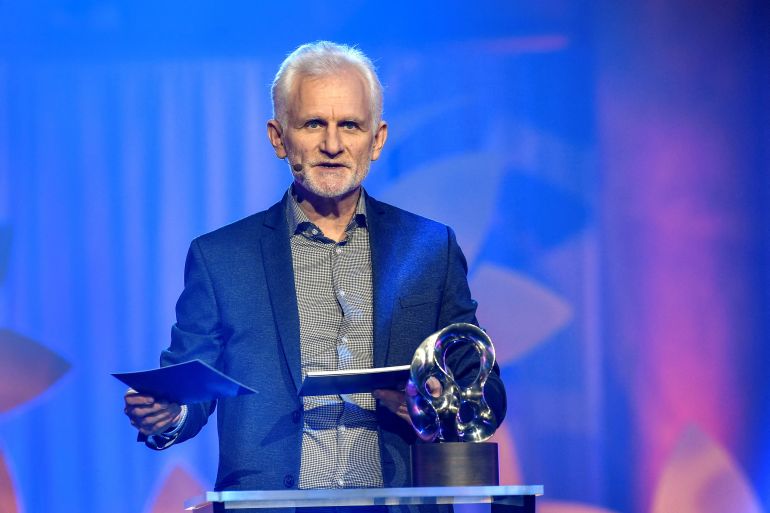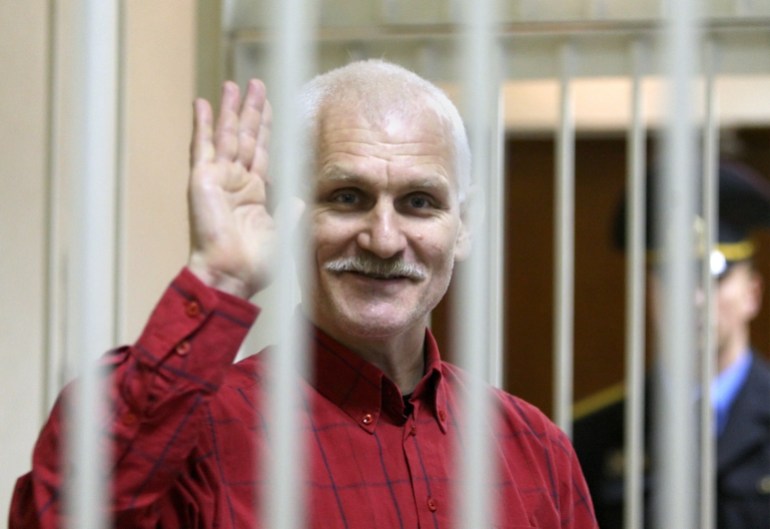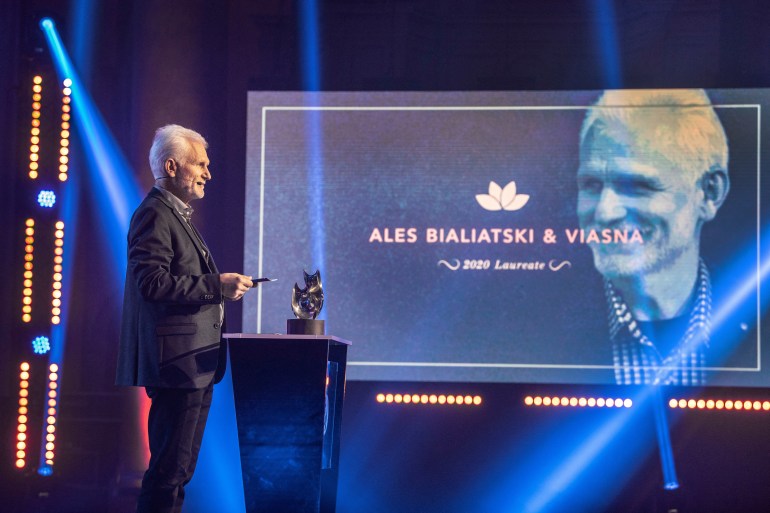Belarus, Russia, Ukraine rights activists win Nobel Peace Prize
Belarusian activist Ales Bialiatski, Russian human rights group Memorial and the Ukrainian organisation Center for Civil Liberties, named winners.

Jailed activist Ales Bialiatski from Belarus, the Russian organisation Memorial and the Ukrainian Center for Civil Liberties group have won the 2022 Nobel Peace Prize for their efforts to document rights abuses.
The announcement was made on Friday at the Norwegian Nobel Institute in Norway’s capital, Oslo.
Keep reading
list of 3 itemsSwedish scientist Svante Paabo wins Nobel Prize in medicine
Nobel Prize in Physics awarded to three scientists
“The Norwegian Nobel Committee wishes to honour three outstanding champions of human rights, democracy and peaceful co-existence in the neighbour countries Belarus, Russia and Ukraine,” said Committee Chair Berit Reiss-Andersen, who also called on Belarus to release Bialiatski from prison.

The Nobel Peace Prize, worth 10 million Swedish crowns, or about $900,000, will be presented in Oslo on December 10, the anniversary of the death of Swedish industrialist Alfred Nobel, who founded the awards in his 1895 will.
“The Peace Prize laureates represent civil society in their home countries. They have for many years promoted the right to criticise power and protect the fundamental rights of citizens,” the Norwegian Nobel Committee said in its citation.
“They have made an outstanding effort to document war crimes, human right abuses and the abuse of power. Together they demonstrate the significance of civil society for peace and democracy.”

Memorial said that winning the award was recognition of its human rights work and of colleagues who continue to suffer “unspeakable attacks and reprisals” in Russia.
“It encourages us in our resolve to support our Russian colleagues to continue their work at a new location, despite the forced dissolution of MEMORIAL International in Moscow,” said a statement by Memorial board member Anke Giesen to Reuters news agency.
As for the Center for Civil Liberties, its representative Volodymyr Yavorskyi told the Associated Press news agency that the award was important because “for many years we worked in a country that was invisible”.
“We are shocked. Even in this morning we knew nothing. We are grateful for this award because we have made a titanic effort at the altar of peace, democracy and freedom. Effort that is still ongoing. The award will give us more strength and inspiration in our further efforts,” Oleksandra Matviichuk, the head of the Center for Civil Liberties, told Al Jazeera.
The organisation founded in 2007 to promote human rights and democracy in Ukraine “has taken a stand to strengthen Ukrainian civil society and pressure the authorities to make Ukraine a full fledged democracy, to develop Ukraine into a state governed by rule of law”, said Reiss-Andersen.
Following Russia’s invasion of Ukraine in February, the group has worked to document Russian war crimes against Ukrainian civilians.
“The center is playing a pioneering role with a view to holding the guilty parties accountable for their crimes,” said Reiss-Andersen.
‘Very powerful message’
Kristian Herbolzheimer, the director of the International Catalan Institute for Peace, told Al Jazeera from Brussels that the prize highlighted “the fraternity between these three countries who are facing similar challenges and situations”.
“But beyond that, the committee has awarded the relevance of civil society and that goes beyond these three countries. There is a shrinking space for critical voices inside countries all over the world, no matter if they are autocracies or democracies,” he said. “Therefore this sends a very powerful message.”

Bialiatski, the 60-year-old head of Belarus rights group Viasna, was arrested in July last year on charges of tax evasion, a move that critics of Belarusian strongman Alexander Lukashenko saw as a thinly veiled tactic to silence his work.
Bialiatski’s organisation, which translates to “Spring” and was founded in 1996, is Belarus’s most prominent rights group, whose work has charted the increasingly authoritarian tendencies of Lukashenko and his security forces.
Established during mass pro-democracy protests several years after the collapse of the Soviet Union, it sought to help imprisoned protesters and their families.
In the years since, Viasna and Bialiatski have gained prominence as Lukashenko’s regime has leaned on more brutal ways of retaining its tight grip on power.
“This is the best person to receive the Nobel Peace Prize because for many years, Bialitski became the symbol of the global fight against tyranny and for the rights of ordinary people, of Belarussians,” Franak Viacorka, Belarusian opposition politician and senior adviser to Sviatlana Tsikhanouskaya, the leader of the Belarusian Democratic Movement, told Al Jazeera from Paris.
“He started his career as a freedom fighter against the Soviet Union in the 1980s, then he fought for Belarusian independence, then he fought against Lukashenko’s regime. He was imprisoned and right now he is finally recognised by the Nobel Committee for dedicating his whole life to something that the entire world calls human rights.”
Meanwhile, the government in Belarus denounced the Nobel Committee for handing its prestigious peace prize to Bialiatski, saying its founder Alfred Nobel was “turning in his grave”.
“In recent years, a number of fundamental decisions of the Nobel Committee are so politicised that, excuse me, Alfred Nobel is tormented and turning in his grave,” foreign ministry spokesman Anatoly Glaz said on Twitter.